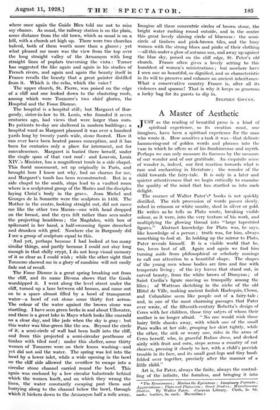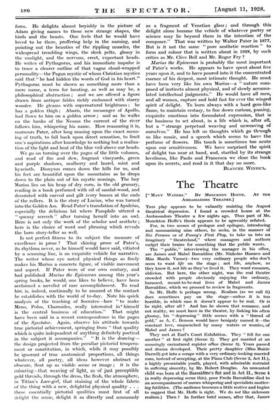A Master of Aesthetic J UST as the reading of beautiful
prose is a kind of spiritual experience, so its creation must, one imagines, have been a spiritual experience for the man who wrote it. How sensitive a task it was—that delicate hammering-out of golden words and phrases into the vase in which he offers us of his frankincense and myrrh. Perhaps we can only measure its fineness by the measure of our wonder and of our gratitude. An exquisite sense of wonder is, indeed, our first reaction towards what is rare and enchanting in literature ; the wonder of the child towards the fairy-tale. It is only in a later and quieter attentiveness that we begin critically to examine the quality of the mind that has startled us into such delight. imagines, have been a spiritual experience for the man who wrote it. How sensitive a task it was—that delicate hammering-out of golden words and phrases into the vase in which he offers us of his frankincense and myrrh. Perhaps we can only measure its fineness by the measure of our wonder and of our gratitude. An exquisite sense of wonder is, indeed, our first reaction towards what is rare and enchanting in literature ; the wonder of the child towards the fairy-tale. It is only in a later and quieter attentiveness that we begin critically to examine the quality of the mind that has startled us into such delight.
The essence of Walter Pater's* books is not quickly distilled. The rich procession of words passes slowly, robed in crimson or white samite, shod in silver or gold. He writes as he tells us Plato wrote, breaking visible colour, as it were, into the very texture of his work, and multiplying the glowing thread into " large tapestried figures." Abstract knowledge for Plato was, he says, like knowledge of a person ; truth was, for him, always something to look at. In holding up the mirror to Plato, Pater reveals himself. It is a visible world that he, too, loves best of all. Again and again we find him turning aside from philosophical or scholarly musings to call our attention to a beautiful shape. The shapes of the young men whose bodies are firm and fine with temperate living ; of the ivy leaves that stand out, in carved beauty, from the white brows of Dionysus ; of Saint Cecilia's figure moving so tranquilly among the lilies ; of Watteau sketching in the niche of the old Hotel de Ville, making ancient foolish Harlequin, Clown, and Columbine seem like people out of a fairy-tale ; and, in one of the most charming passages that Pater ever wrote, of the fifteenth-century Robetta's design of Ceres with her children, those tiny satyrs of whom their mother is no longer afraid. " No one would wish those hairy little shanks away, with which one of the small Pans walks at her side, grasping her skirt tightly, while the other, the sick or weary one, rides in the arms of Ceres herself, who, in graceful Italian dress, and decked airily with fruit and corn, steps across a country of cut sheaves, pressing it closely to her, with a child's peevish trouble in its face, and its small goat-legs and tiny hoofs folded over together, precisely after the manner of a little child."
Art is, for Pater, always the finite, always the control- ling of the infinite, the formless, and bringing it into * The Renaissance ; Marius the Epicurean ; Imaginary Portraits ; Appreciations ; Plato and Platonism ; Greek Studies ; Miscellaneous Studies. By Walter Pater. (Caravan Library. Cloth, 3s. Rd. each.: leather, 5a. each. Macmillan.) • • form. He delights almost boyishly in the picture of Adam giving names to those new strange shapes, the birds and the beasts. One feels that he would have loved to be there, proffering help in the naming, and pointing out the beauties of the rippling muscles, the widespread trembling wings, the sleek pelts, glossy in the sunlight, and the nervous, erect, expectant heads. He writes of Pythagoras, and his immediate impulse is to trace a clearer outline of that vague cloud-wrapped personality—the Pagan mystic of whom Christian mystics said that " he had hidden the words of God in his heart."
Pythagoras must be shown as something more than a mere name, a term for locating, as well as may be, a philosophical abstraction ; and we are offered a figure drawn from antique fables richly embossed with starry wonder. He gleams with supernatural brightness ; he has a golden thigh ; Abaris, the messenger• of Apollo, had flown to him on a golden arrow ; and as he walks on the banks of the Nessus the current of the river follows him, whispering his name. How reassuring it is, murmurs Pater, after long musing upon the exact mean- ing of truth, to fall back upon direct sensation, to limit one's aspirations after knowledge to nothing but a realiza- tion of the light and heat of the blue veil above our heads.
We go on turning over the pages of the little volumes, and read of fire and dew, fragrant vineyards, green and purple shadows, mulberry and laurel, mint and hyacinth. Dionysus comes down the hills for us, and his feet are beautiful upon the mountains as he drops down to the plain out of his mystic musings. The boy Marius lies on his heap of dry corn, in the old granary, reading in a book perfumed with oil of sandal-wood, and decorated with carved and gilt ivory bosses at the ends of the rollers. It is the story of Lucius, who was turned into the Golden Ass. Read Pater's translation of Apuleius, especially the delicious bit where Pamphile uttered a " queasy screech " after turning herself into an owl. Here is not only the work of the scholar and aesthete ; here is the choice of word and phrasing which reveals the born story-teller as well.
Is not perfect fitness to its subject the measure of excellence in prose ? That shining prose of Pater's, its rhythms never, as he himself would have said, vitiated by a scanning line, is an exquisite vehicle for narrative. The writer whose eye noted physical things so finely makes his Marius a concrete figure, of visible movement and aspect. If Pater were of our own century, and had published Marius the Epicurean among this year's spring books, he would, one likes to believe, have been acclaimed a novelist of rare accomplishment. To read him is, indeed, continually to be amazed at the contact he establishes with the world of to-day. Note his quick analysis of the teaching of Socrates—how " to make Meno, Polus, Charmides, really interested in• himself is the central business of education." That might have been said in a recent correspondence in the pages of the Spectator. Again, observe his attitude towards true pictorial achievement, springing from " that quality which is quite independent of anything definitely poetical in the subject it accompanies." " It is the drawing— the design projected from the peculiar pictorial tempera- ment or constitution, in which, while it may possibly be ignorant of true anatomical proportions, all things whatever, all poetry, all ideas however abstract or obscure, float up as visible scene or image ; it is the colouring—that weaving of light, as of just perceptible gold threads, through the dress, the flesh, the atmosphere, in Titian's Lace girl,_ that staining of the whole fabric. of the thing with a new, delightful physical quality . . . these essentially pictorial qualities must first of all delight the sense, delight it as directly and sensuously as a fragment of Venetian glass ; and through this delight alone become the vehicle of whatever poetry or science may lie beyond them in the intention of the composer." That was written by Walter Pater in 1877. But is it not the same " pure aesthetic reaction " to form and colour that is written about in 1928, by such critics as Mr. Clive Bell and Mr. Roger Fry ?
Marius the Epicurean is probably the most important of Pater's works. He appears to have spent about five years upon it, and to have poured into it the concentrated essence of his deepest, most intimate thought. He must have been very like his own Marius—a " nature com- posed of instincts almost physical, and of slowly accumu- lated intellectual judgments." He would have all men, and all women, capture and hold fast for ever the winged spirit of delight. To burn always with a hard gem-like flame, to maintain ecstasy, to fine down curious, passing, exquisite emotions into formulated expression, that is the business to set about, in a life which is, after all, but a " strange perpetual weaving and unweaving of ourselves." He has left us thoughts which go through us like music, and a speech which seems to have the perfume of flowers. His touch is sometimes too acute upon our sensitiveness. We have surprised the spirit of delight too near at hand, and, startled by its strange loveliness, like Paolo and Francesca we close the book upon its secrets, and read in it that day no more.
BLANCHE WINDEX.





























 Previous page
Previous page